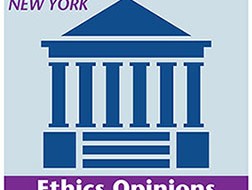Lawyer May Bill Hourly Rate When Appearing as Witness
By Lazar Emanuel [Originally published in NYPRR June 1999]
N.Y. State Bar Op. 714 (1999)
Question: May a lawyer accept compensation from a former client for time in preparing to testify in a matter and for testifying as a witness?
Answer: Yes, provided the compensation is not illegal.
Facts: A former client is involved in litigation. The lawyer does not represent either side in the litigation and is not prevented from appearing as a witness under the provisions of DR 5-101(B). The subject of the proposed testimony relates to the lawyer’s former representation of the client.
Opinion: The question raises legal and ethical issues. The Committee expresses no opinion on the legality of compensation for the lawyer as witness but notes that in some cases compensation may be illegal. If it is illegal, it is also unethical. Even if it is legal, it is not necessarily ethical.
CPLR 8001 controls the compensation of witnesses under subpoena. It provides for payment to witnesses of $15 for each attendance day and 23 cents per mile of travel expense. A client with full knowledge of this statutory limitation may nevertheless agree to pay a larger sum to his former attorney. The larger sum is governed by DR 7-109(C)(2) which provides for payment to a non-expert witness of “reasonable compensation … for the loss of time in attending or testifying.”
Reasonable compensation is the “market value” of the testifying witness. So long as the client is made aware that there is no obligation to pay more than the statutory fee, it is permissible for a lawyer to charge an amount equal to his customary hourly fee. However, if the lawyer’s charges in the former representation included compensation for subsequent testimony, it would not be reasonable for the lawyer to accept additional compensation as witness in this litigation.
Lazar Emanuel is the Publisher of NYPRR.
DISCLAIMER: This article provides general coverage of its subject area and is presented to the reader for informational purposes only with the understanding that the laws governing legal ethics and professional responsibility are always changing. The information in this article is not a substitute for legal advice and may not be suitable in a particular situation. Consult your attorney for legal advice. New York Legal Ethics Reporter provides this article with the understanding that neither New York Legal Ethics Reporter LLC, nor Frankfurt Kurnit Klein & Selz, nor Hofstra University, nor their representatives, nor any of the authors are engaged herein in rendering legal advice. New York Legal Ethics Reporter LLC, Frankfurt Kurnit Klein & Selz, Hofstra University, their representatives, and the authors shall not be liable for any damages resulting from any error, inaccuracy, or omission.
Related Posts
« Contract Lawyer & Client Confidences Lawyer Needs Insured’s Consent Before Submitting Bills to Insurer’s Auditor »












